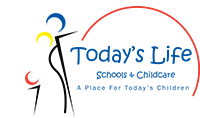

Watching each child go through the process of learning how to decipher sounds into meaningful language is truly remarkable. As children hear and learn to reproduce sounds, their developing brains allow them to make sense of the language and they discover that certain sounds and words fit together in meaningful ways. That’s why early childhood is the opportune time to introduce each child to a second language.
At Today’s Life, we offer regular Spanish lessons to our toddler, preschool, and pre-k groups.
We integrate Spanish into our regularly scheduled play and circle time activities. In order to make learning more fun for your child, we try to incorporate Spanish lessons with play and exploration, allowing your child to experiment with new sounds, sentences, and words. Our Spanish program allows children to grow both intellectually and cognitively.
Some of Today’s Life graduates go on to enter Spanish immersion programs when they begin kindergarten. Whether you decide immersion is right for your family or not, all students benefit from Spanish language experiences that set the stage for advanced proficiency later in life.
Schedule a visit to Today’s Life Schools & Child Care. Click here or call us at (952) 358-2020 for Eden Prairie or (763) 951-2032 for Brooklyn Park!
Learning Spanish can certainly have a positive affect on a child's native language development. It will help them improve their cognitive and linguistic skills, plus their understanding of different cultures. It can enhance their multitasking skills as well.
Spanish lessons can provide a foundation for future language learning and can also improve a child's chances of success in education and careers where knowledge of Spanish is an asset.
Learning Spanish can stimulate a child's brain, promote problem-solving skills and enhance their memory and attention to detail. Bilingualism can improve executive functions, such as the ability to switch between tasks and inhibit inappropriate responses. Additionally, being bilingual can delay the onset of age-related cognitive decline and improve overall cognitive functioning in later life.
Spanish lessons can be made fun for young children by incorporating games, songs, and hands-on activities into the curriculum.
Yes, Spanish lessons can be tailored to meet the individual needs and learning styles of each child through the use of various teaching methods and learning materials.
Consistency is important in Spanish lessons for children, as it helps to reinforce what has been learned and ensures that children make steady progress in their language development.
Parents can encourage learning Spanish outside of their child's lessons by providing Spanish-language books, movies and other materials, as well as encouraging them to speak Spanish with friends and family members.
Spanish lessons can boost a child's self confidence by giving them a sense of accomplishment and pride in their new language skills. As these skills continue to improve, your child might feel a sense of achievement - he or she can apply what they have learned in real life situations. Learning a new language may also help children appreciate and value their own language and cultural background, leading to a stronger sense of identity.
We use a mix of Language learners and teacher directed lessons to teach the children Spanish three days a week.
In our toddler program it is 7-1. For preschool and pre-k, it is 10-1.
We teach Spanish class 3 days a week M-W-F for 30 minutes.
Our lessons are interactive and repetitious to engage the children in learning retention. We are happy to provide examples.
We evaluate the skill level each child at conference time with the help of our ongoing assessments of the children.
Our Spanish program is included within the cost of our tuition.


